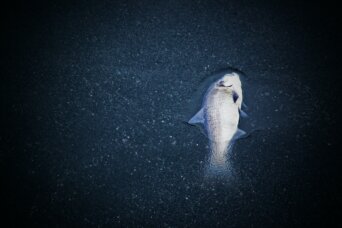- About
- Topics
- Story
- In-Depth
- Picks
- Opinion
- News
- Donate
- Signup for our newsletterOur Editors' Best Picks.Send
Read, Debate: Engage.
| topic: | Transparency and Corruption |
|---|---|
| located: | Bosnia and Herzegovina |
| editor: | Katarina Panić |
The removal of dead fish near the Bosnian town Prnjavor began this Monday. The workers have dug holes for animal waste to be poured into along with hydrated lime before being buried. The estimations of damage range from 5 to 15 tons of perch, carp and silver carp. Wild animals and flocks of birds have been eating the dead fish for days, and thus spreading the risk of infection. It seems that the economic and environmental incident is man-made. Or, at least, it was not prevented by people, although they could have intervened.
Fun fact: once the people who live around started to complain about the stench after the die-off of fish began, the inspectors who arrived to control the site had no one to turn to. The fish farm, Ribnjak, went bankrupt over a year ago. Three different bankruptcy trustees have been appointed so far, however none of them completed the procedure. Some of them were let go, others resigned themselves. The fourth person was appointed last week after the issue had already escalated.
“I am convinced that a group of tycoons is behind all of this. They have ruined a lot of companies in Prnjavor, and only Ribnjak left,” the mayor of Prnjavor, Darko Tomaš, told the media, alluding to the well-known practice of abuse during the privatisation in the post-war period all over the former Yugoslavia. “After we addressed the issue in March, they put pressure on the local assembly councillors and even the people in the bankruptcy procedure.”
Namely, war profiteers and other people who became rich overnight, along with decision-makers, have created various tools not only to decrease the accounting value of state-owned companies in order to buy them cheaply, but to illegally trade the state property, including natural resources.
In addition to these well-developed mechanisms in Prnjavor’s farm fish case, global warming assisted, too.
The fish died due to high temperatures and clogged canals that supplied the ponds with water from two rivers. The employees say they have no machines for keeping the water flowing any longer, and that it has been years since appropriate maintenance took place.
It gets worse.
“We warned the assembly of creditors in January this year - and there is a written record about it - that the fish has not been fed since October 2019,” Mladen Kitić, the former production manager at Ribnjak, told the media. “We thought it won't survive the winter, but somehow it did. It was exhausted, in bad condition and in poor health, so it didn’t manage to survive the heat and the lack of water.”
Image: Michael & Diane Weidner.

